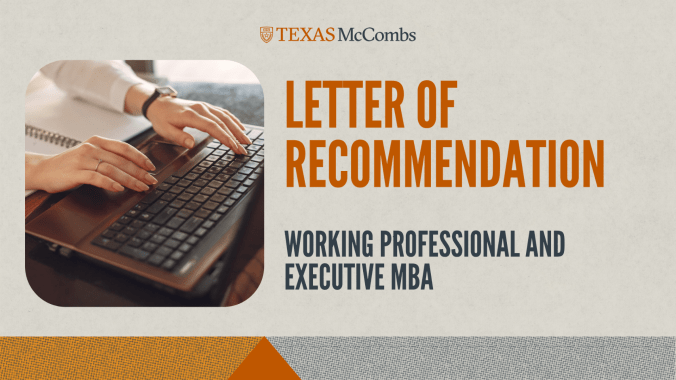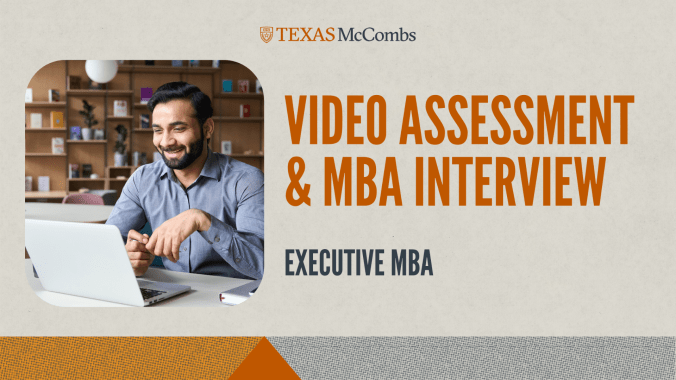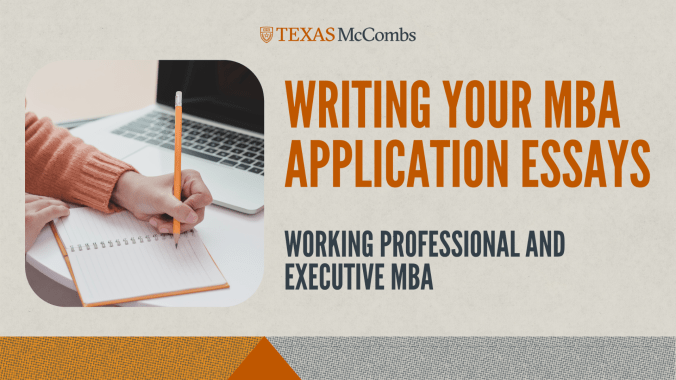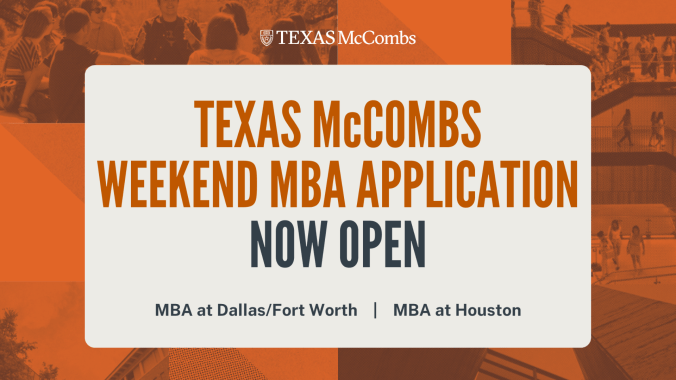The Texas McCombs Working Professional and Executive MBA applications require one professional letter of recommendation from a person who has supervised your work and/or has directly assessed your work performance during your career.
A recommendation letter is the only component of your application where you rely on someone else to provide information, so it is important that you carefully decide who you will ask to be your recommender. The Admissions Committee uses this recommendation to assess your work capabilities, such as your motivation, contribution, strengths, areas of growth, etc.
What is in the Recommendation Letter?
First of all, this is NOT the traditional letter of recommendation you typically think of where someone writes a letter on your behalf to vouch for your professional performance. Texas McCombs uses the GMAC Common Letter of Recommendation. Your recommender will receive a link to assess specific competencies/traits and answer three short-response questions.
Keep in mind that while there are other programs using this form, some schools will ask a different series of questions. If you’re applying to more than one MBA, you may be asking your recommender to separately fill out different forms. Make sure they do not copy and paste their responses.
Who should write your MBA Recommendation?
Circumstances differ for every applicant and deciding who you should ask might vary. Below are some scenarios to help guide you in choosing the best recommender for your MBA application.
Your Supervisor
Your current direct supervisor is traditionally the best choice. This is likely the person in your network that knows your strengths and weaknesses better than anyone else and can speak to your professional capabilities.
However, in some instances, your current supervisor may not be a viable option for you. Perhaps you aren’t able to communicate to your employer that you’re applying to business school or you do not work with your direct boss that closely. It could also be that you attained a new role recently and your current supervisor has not had a chance to work with you very long. Or, you’re an entrepreneur and don’t have a supervisor.
All of these are valid reasons to look for other recommendation sources. If you choose to request a different recommender than your current supervisor, please explain your choice in the Optional Essay.
Your Former Supervisor
If you cannot ask your current direct supervisor to write your recommendation, maybe you can ask a previous supervisor? Depending on how recently you worked with them, the “old boss” may be the best choice, especially if you had a strong professional relationship with that person. This is the most common alternative option.
Your Indirect Supervisor
Asking an indirect supervisor can be another option, especially if you’ve worked with this person closely on long-term projects or significant assignments. This is a nice alternative to a supervisor that you may not work with closely.
Your Client or Vendor
This recommendation source is typically useful for entrepreneurs or for applicants who work for a family business. If you work for a family business, it is preferred that you ask an individual outside of your family to write your letter of recommendation.
Mentor or Other Options
Mentors can be from inside or outside of your workplace who have a clear understanding of your professional value. Also, there are many individuals who may fall in the category of “other recommenders.” For example, a former professor, a colleague, or a coach. However, be sure that the person you select has worked with you on measurable tasks and understands your professional experiences to ensure they will provide a recommendation with depth. This is the least preferred option by the admissions committee.
Other Tips:
- Don’t focus only on title – the CEO of a large company may sound like an impressive recommendation, but unless they work with you closely, the recommendation letter will likely fall short of delivering the information that the Admissions Committee is looking for.
- Steer clear of asking a direct report (someone who reports up to you) to submit a letter of recommendation.
- When it comes to other options, use your best judgment. An undergraduate professor may not be the best person to address some of the questions posed on the recommendation form and the Admissions Committee is looking mainly at your post-undergraduate work experience.
You’ve chosen a recommender. What’s next?
First, before asking your recommender to take this on, keep in mind that they are likely a busy individual – be sure to give them plenty of notice prior to the application deadline.
Secondly, give them a heads-up about your request. You don’t want to blindly email someone and ask them to write something for you without having a conversation. It may be a good idea to revisit certain projects you worked with them on. Most importantly, explain to your recommender why you’re pursuing an MBA. Giving them some context behind your ask will go a long way and will likely result in a stronger letter.
Finally, make sure you give them all the information on the recommendation before you ask, especially the timeline for when you will be submitting your application. Let them know they will be receiving a link to fill out the recommendation, and that they do NOT need to write a supplemental letter.
If you have any questions during the application process, we’re here to help. Join us at an upcoming event to connect and learn more about Texas McCombs. Please sign up for MBA news and follow us on Instagram at @UTexasMBA to stay updated.
Hook ’em!









